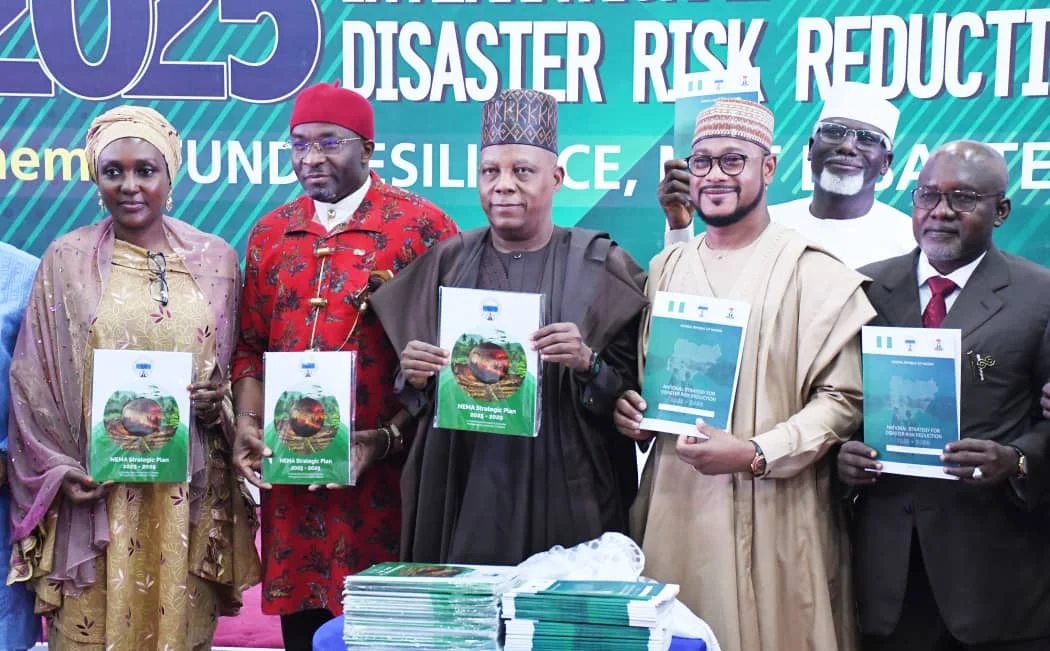Vice-President Kashim Shettima says President Bola Tinubu’s administration is developing a National Disaster Risk Financing Framework to guarantee timely funding for prevention and preparedness against disasters.
Shettima disclosed this at the 2025 International Day for Disaster Risk Reduction (IDDRR) themed “Fund Resilience, Not Disasters”, organised by the National Emergency Management Agency (NEMA) on Monday in Abuja.
According to him, the administration is strengthening partnerships with development partners, the private sector, and research institutions to drive innovation and build resilience at all levels.
“If we fail to invest in resilience, we will continue to spend our scarce resources cleaning up after crises instead of building lasting prosperity,” Shettima said.
He noted that President Tinubu considers resilience a national priority and is integrating disaster risk reduction into key sectors — including agriculture, infrastructure, education, and health.
The vice-president added that the government is expanding early warning systems to ensure that communities receive timely alerts before floods, droughts, or disease outbreaks occur.
“We are strengthening state and local emergency management agencies through training, technology, and coordination support,” he said.
Shettima stressed that commitment alone was not enough, urging that words must be matched with action and policies with funding.
“To fund resilience is to invest in drainage systems, not relief camps; to build stronger schools and hospitals, not temporary shelters.
It means supporting farmers with climate-smart tools, not just food aid after floods, and training first responders before the sirens start to wail,” he stated.
He emphasised that resilience cannot be achieved by government alone, as it depends on collaboration among all sectors.
“It is reflected in how we plan our cities, how businesses protect workers, and how communities share information and look out for one another,” he said, urging the private sector to embed risk reduction into corporate planning and investment decisions.
Shettima also called on academia and research institutions to generate the data, innovation, and practical research needed to guide policy decisions, while urging civil society to ensure accountability and mobilise citizens around preparedness.
“We must replace reaction with readiness, and fear with foresight,” he concluded, commending NEMA and its partners for their contributions to national safety and resilience.
Sununu Calls for Comprehensive Disaster Risk Management
The Minister of Humanitarian Affairs and Poverty Reduction, Mr. Yusuf Sununu, also underscored the need for a comprehensive and holistic approach to disaster risk management in Nigeria.
He said Nigeria has suffered greatly from floods, droughts, landslides, insurgency, and banditry, which have worsened humanitarian and poverty reduction challenges.
“A nation that cannot absorb shock or recover quickly will have prosperity far from it,” Sununu warned, adding that Nigeria must reduce its reliance on external funding by improving domestic resource mobilisation.
The minister outlined several ongoing initiatives, including the Conditional Cash Transfer Programme, which has reached over 8.1 million households, and plans to provide interest-free loans of ₦300,000 each to 21,000 Nigerians for dry-season farming and flood mitigation.
NEMA, Partners Advocate More Funding and Transparency
The Director-General of NEMA, Mrs. Zubaida Umar, called for increased funding for disaster risk management to build national resilience.
She announced two new policy instruments — the NEMA Strategic Plan (2025–2029) and the National Disaster Risk Reduction Strategy (2025–2030) — aimed at institutionalising proactive and preventive disaster management.
“We must rethink how we fund resilience — from reactive, ad-hoc disaster response to a multi-stakeholder financing architecture that supports prevention, preparedness, and sustainable recovery,” she said.
Similarly, Dr. Charles Usie, Country Director of PLAN International Nigeria, highlighted the need for greater transparency and accountability in NEMA’s projects and funding.
He recommended improved data collection, financial disclosure, and coordination among stakeholders to ensure efficiency.
“We cannot continue to call for increased funding without improving performance and accountability. NEMA must publish its budgets, allocations, and expenditures as much as possible,” he said.
By implementing these measures, experts agreed, Nigeria can build the financial backbone necessary for long-term stability and protect its developmental gains from recurring disasters.





